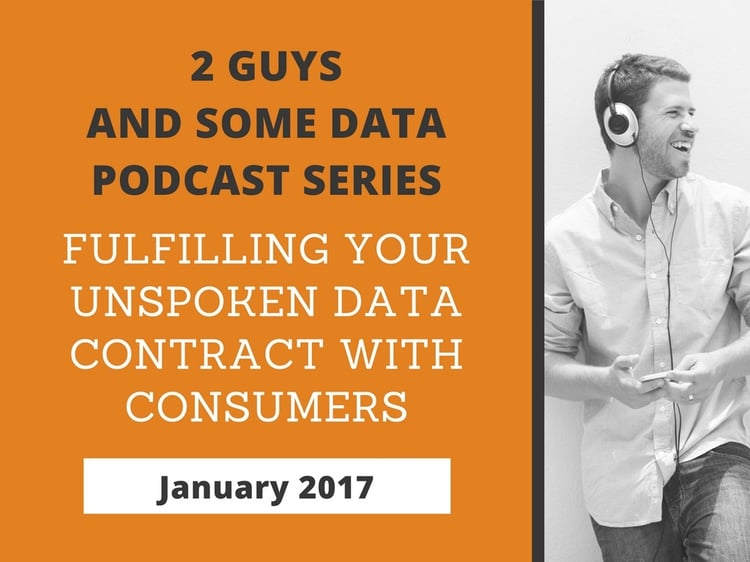The use of data to track individual consumers and market directly to them solves many of the problems posed by the broad-stroke marketing tactics of yesteryear. However,...

Data-driven marketing has exploded with potential as data capturing capabilities, and data integration, have improved. Marketers have access to more personal consumer data than ever before, but when you collect that data, you are signing an implicit data contract with that consumer. So what is the "data contract," and what must marketers do to uphold their end?
Download our eBook to learn how to leverage your website visitors browsing behavior to deliver individualized next-gen marketing.
(Podcast Transcription)
Allen: Hey, to all the data-driven marketers out there, looking for new ways to reach unique prospects and better engage audiences. This is fourth podcast for the 2 Guys and Some Data series available on iTunes and Soundcloud, giving you the nitty-gritty advice you need to actually make more money. I'm Allen Abbott.
Larry: I'm Larry Kavanagh.
Allen: Today, we're talking about the implicit contract you and your consumers sign when you collect consumer data. Before you say, "That's not for me," hear us out. If you're using data in your marketing strategies, you have an obligation to deliver on your end of this data contract, and we want to fill you in.
Larry: Allen, what is a data contract? Are we talking about privacy policies, the CAN-SPAM law, some new legislation pending in Congress? What are we talking about today?
Allen: Funny you should say that. Most marketers, when they think about their obligations around data, probably do think about those kinds of things, but that's not what I'm talking about today. Marketers have the ability to gather data from a multitude of sources and compile it to gain a complete and unprecedented view of an individual. Marketers can also purchase data, like what kind of car you drive, what brand of over-the-counter drugs you prefer, whether you like to collect coins. The depth of data is astounding. Acxiom, for example, claims to have on average 1500 pieces of information on more than 200 million Americans. The data contract is the obligation that marketers have to use data ethically and to respect the privacy of consumers.

Larry: You're talking about not doing things like what Target did a few years ago. You may be familiar with the story of the man who walked into a Target store angry about the coupons the store was sending his teenage daughter for maternity clothes and cribs. He asked the store manager, "Hey, is Target trying to encourage my daughter to get pregnant?" Turns out she actually was pregnant but hadn't told her family, yet. Target used a data-mining algorithm to figure it out. As made up as that story sounds, it really happened.
Allen: That's one very scary example. There's a lot of personal information available today, and misuse of that information could cause a consumer revolt.
Larry: We certainly saw a consumer revolt about a decade ago around spam email misuse. That lead to the CAN-SPAM laws.
Allen: Yes. Today the risk for marketers is even greater. In addition to additional legislation, consumers can now act directly. For example, they are adopting ad blockers at a frightening pace in response to what they see as annoying, non-relevant marketing from advertisers. There is only one way for marketers to avoid both scrutiny from regulators and opting-out by consumers, to provide individualized marketing messages in a way that does not feel creepy, intrusive, or annoying.
Larry: Well, I'd admit, my inner geek loves using all this data. In truth, data can make marketing much more effective and provide a better customer experience. According to the User Testing blog, 86% of consumers will pay more for a better customer experience. We see the same thing with the correct use of marketing data. A better customer experience translates to higher response rates, higher average order and lower marketing costs. Allen, I'll tell you. I'm scared to death that shady, or even just lazy, marketers will blow it for all of us.
Allen: Larry, that's why it's important to adopt a company-wide culture that wants to establish a data contract with your consumers. Everyone from the top down must be willing to use data in a way that really puts the consumer's best interest at the center of all business decisions. Without a consumer-focused approach to data access and usage, marketers can look at the treasure trove of data they can gather and see only the value that they can get, until consumers have had enough and restrict access to that data. Larry, how do marketers hold up their end of the data contract?
Larry: By giving consumers what they want, value in the form of individualized marketing that meets their needs in the moment.
Allen: How do they do that?
Larry: First, realize that not every moment is an I-want-to-buy-it moment. Your marketing must also exist in the dreaming, in the researching, and in the planning moments of the customer journey. Second, analyze the intent data from your most interested audience, the visitors on your website. This source of data can help you gain insights into why an individual is engaging with your company and where they are on their path to purchase. Third, integrate data from different sources and channels, all the moments of the customer's journey across various touch points, both inside and outside of your company, to create a more complete view of the customer. Fourth, be sensible about what data you use and how you use it.

Allen: Okay, Larry, I get it. With this complete view you'll understand why people come to your site, where they're coming from, and what they want, and how they want it. You'll also learn what your company isn't providing to help the consumer on their journey. Individualization is the combination of having the necessary marketing materials ready to go to help guide the consumer when they're at the top of the funnel, as well as the capabilities to create individualized, personally-addressable marketing pieces at the bottom of the funnel that speak directly to their current I-want-to-buy moment.
Larry: Remember, individualization isn't only used in digital and email marketing. Direct mail, the advertising medium with the highest response rate, can be individualized and sent when it is relevant to the consumer.
Allen: All this individualization is based on consumer data?
Larry: Exactly. There can be no individualization without data. If you want to keep using that data, you must provide consumers with better, more relevant marketing that meets their specific needs, hence, a data contract. Hey, Allen, by the way, I checked my data-mining algorithm. Turns out, neither of us are pregnant.
Allen: Good to know. My wife will be very pleased. Very good.
Larry: Everyone, thanks for listening to two guys ramble about data and marketing for the past few minutes. If you got what you needed, you'll probably like our blog, too. Check out more of our resources at navistone.com/blog. Again, that's navistone.com/blog. I'm Larry Kavanagh.
Allen: I'm Allen Abbott.
Larry: We'll be back in a few weeks to talk about the difference between personalization and individualization in marketing and why marketers who only personalize are super wimpy.

